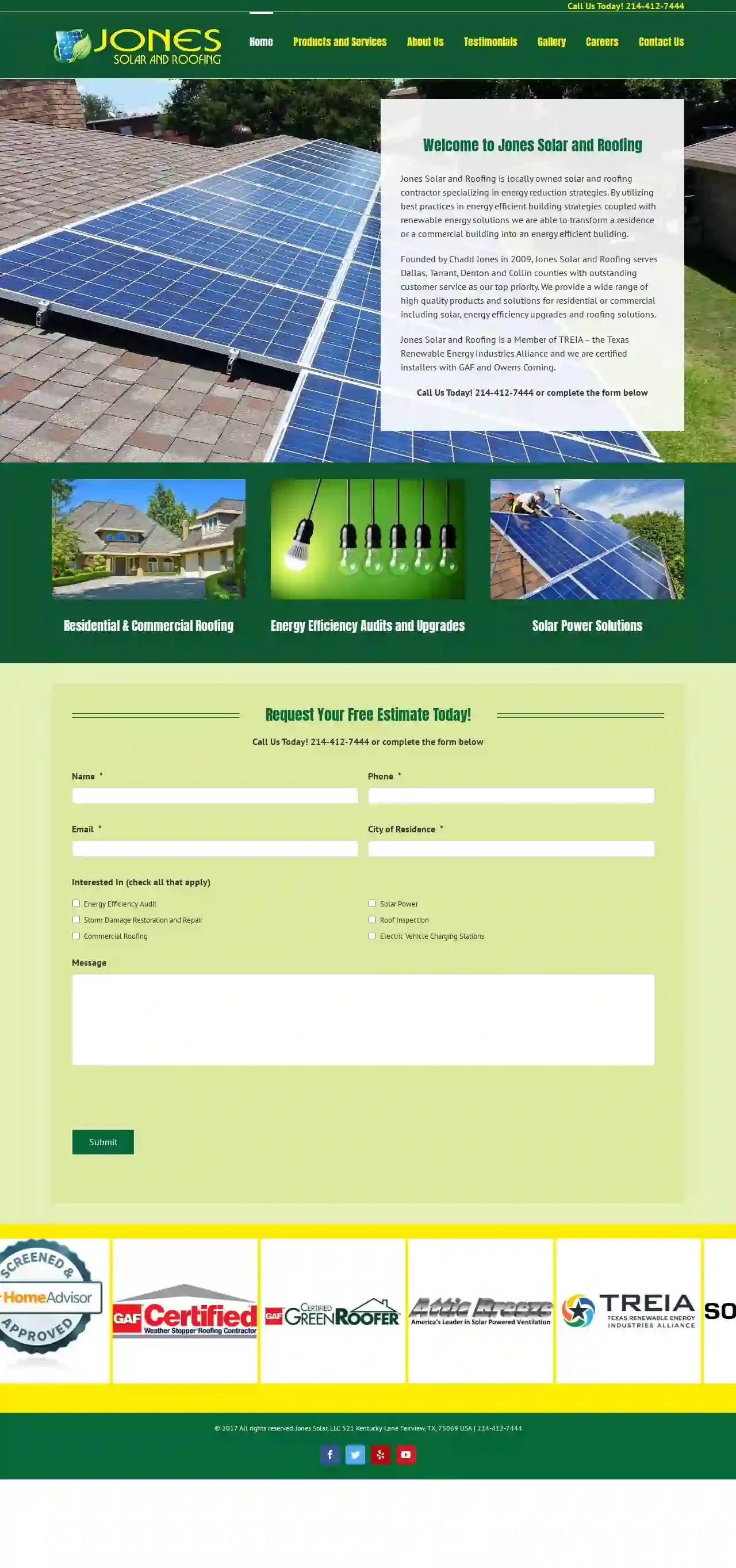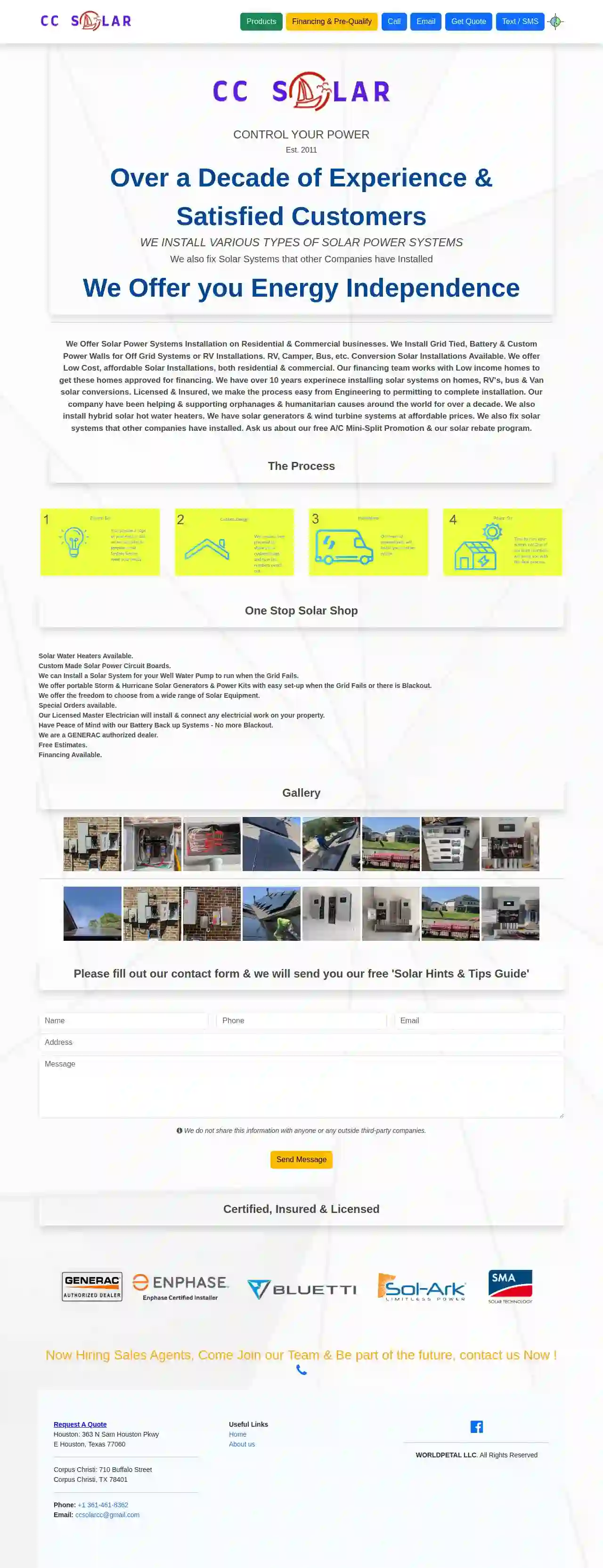Commercial Solar Installers Arlington
Find Solar for Businesses in Arlington
Get up to 3 Commercial Solar Companies quotes for your project today! Compare profiles, reviews, accreditations, portfolio, etc... and choose the best service.

North Texas Solar
4.635 reviews1452 Hughes Road, Suite 200, Grapevine, 76051, USNorth Texas Solar, LLC is a locally owned and operated solar energy company that has been serving the Dallas – Fort Worth area since 2015. Their mission is to educate people on the benefits of solar, including potential electric savings, solar tax credits, and utility rebates. They work with all local utilities including Oncor, Coserv, Denton Municipal Electric, and most other local Co-ops. They offer affordable prices and zero down payment options available, and they customize your solar panel system to meet your needs.
- Services
- Why Us?
- Accreditations
- Our Team
- Testimonials
- Gallery
Get Quote
Jones Solar LLC
521 Kentucky Lane, Fairview, TX, 75069, USJones Solar and Roofing is locally owned solar and roofing contractor specializing in energy reduction strategies. By utilizing best practices in energy efficient building strategies coupled with renewable energy solutions we are able to transform a residence or a commercial building into an energy efficient building.
- Services
- Why Us?
- Accreditations
- Our Team
- Testimonials
- Gallery
Get Quote
Hawaii Pacific Solar LLC
Lahaina, HI, Hawaii, 2010 Honoapiilani Highway, Suite C-1, 96761, USHawaii Pacific Solar’s mission is to contribute to the sustainability of Hawaii by being a leading developer and designer of photovoltaic and other energy saving systems and by supporting community environmental efforts.
- Services
- Why Us?
- Accreditations
- Our Team
- Testimonials
- Gallery
Get Quote
KW Solar
4.625 reviews5750 N Sam Houston Pkwy E #810, Houston, 77032, USWe deliver clean, free energy from the sun to our fellow man, all across Texas and the Gulf Coast.
- Services
- Why Us?
- Accreditations
- Our Team
- Testimonials
- Gallery
Get Quote
Sol Tech Solar
4.928 reviews5701 W Slaughter Lane A 130, Austin, TX, 78749, USSol Tech Solar is a leading solar energy company in Austin, TX, dedicated to providing sustainable and eco-friendly solar energy solutions for homeowners across Texas. With a commitment to customer satisfaction and a team of skilled professionals, Sol Tech Solar offers customized solar solutions including solar panel installation for residential, generator installations, battery backups, and maintenance services.
- Services
- Why Us?
- Accreditations
- Our Team
- Testimonials
- Gallery
Get Quote
SolarCo Energy
52 reviewsSolarCo Energy, Suite 100, 123 Solar Way, Irvine, 92660, USSolarCo Energy is a team dedicated to helping business owners save money and create a revitalizing impact on the earth through renewable energy. They offer a range of services including commercial solar systems, energy storage, consultations, and design. Their mission is to create value and save money for business owners while creating a revitalizing impact on the earth through renewable energy.
- Services
- Why Us?
- Accreditations
- Our Team
- Testimonials
- Gallery
Get Quote
American Sentry Solar - San Antonio
4.222 reviews221 Gateway Drive, Bel Air, MD, 21014, USAmerican Sentry Solar is a leading provider of solar energy solutions in Maryland, Delaware, and Pennsylvania. Our mission is to make solar simple by offering exceptional service, an incredibly easy process, and top-quality solar panels. We believe in the power of solar energy to transform homes and communities, and we're dedicated to helping our customers achieve energy independence.
- Services
- Why Us?
- Accreditations
- Our Team
- Testimonials
- Gallery
Get Quote
StarAlt Solar
3.949 reviewsN/A, USStarAlt Solar is a leading provider of solar solutions, offering residential, commercial, and utility-scale services. With over 50 years of combined experience, the company specializes in designing, engineering, maintaining, and installing top-tier solar systems. StarAlt Solar serves Texas and Indiana, providing customers with energy independence and significant savings on their electric bills.
- Services
- Why Us?
- Accreditations
- Our Team
- Testimonials
- Gallery
Get Quote
The Solar Company
51 reviewsThe Solar Company, Suite 100, 123 Solar Street, Dallas, 75001, USThe Solar Company is a leading provider of commercial solar systems, offering a range of services including solar panels for apartments, carports, warehouses, and solar field installations. With a turnkey process, they ensure that clients receive comprehensive solutions tailored to their specific needs. Their team, led by founder Travis Wildeman, is dedicated to delivering high-quality service and building long-lasting relationships with clients.
- Services
- Why Us?
- Accreditations
- Our Team
- Testimonials
- Gallery
Get Quote
CC SOLAR
54 reviews363 N Sam Houston PkwyE, Houston, 77060, USCCSolar is a leading provider of solar power systems installation, offering energy independence to residential and commercial businesses. With over a decade of experience and a team of licensed and insured professionals, we specialize in grid-tied, battery, and custom power walls for off-grid systems or RV installations. Our services include solar water heaters, custom-made solar power circuit boards, and solar generators and wind turbine systems at affordable prices. We also offer financing options for low-income homes and support humanitarian causes worldwide.
- Services
- Why Us?
- Accreditations
- Gallery
Get Quote
Over 4,210+ Solar Companies on our directory
Our solar providers operate in Arlington & surroundings!
SolarCompaniesHub has curated and vetted Top Solar Installers in Arlington. Find the most reliable pro today.
Frequently Asked Questions About Commercial Solar Installations
- System Size (kW): Larger systems generally cost more.
- Type of Solar Panels: Higher-efficiency panels can have a higher upfront cost but may generate more energy over time.
- Roof Complexity: Complex roofs (e.g., multiple angles, obstructions) may require more labor and specialized mounting hardware, increasing costs.
- Labor Costs: Labor rates vary by location.
- Permitting and Interconnection Fees: Costs for permits, inspections, and connecting to the grid can vary.
- Available Incentives: Tax credits, rebates, and other incentives can significantly reduce the overall cost.
- High Energy Consumption: Businesses with significant electricity usage, such as manufacturing facilities, data centers, and large retail stores, can benefit greatly from the cost savings of solar.
- Large Roof Space: Businesses with ample roof space have the potential for larger solar installations, maximizing energy generation and financial returns.
- Available Land: Businesses with unused land can consider ground-mounted solar farms for larger-scale energy production.
- Long-Term Occupancy: Businesses planning to occupy their building for an extended period can maximize the long-term benefits and ROI of a solar investment.
- Sustainability Goals: Businesses committed to reducing their environmental impact can leverage solar to achieve their sustainability objectives.
What is the lifespan of a commercial solar system?
How much does a commercial solar system cost?
Can I add battery storage to my commercial solar system later?
What types of businesses are best suited for commercial solar?
What is the lifespan of a commercial solar system?
How much does a commercial solar system cost?
- System Size (kW): Larger systems generally cost more.
- Type of Solar Panels: Higher-efficiency panels can have a higher upfront cost but may generate more energy over time.
- Roof Complexity: Complex roofs (e.g., multiple angles, obstructions) may require more labor and specialized mounting hardware, increasing costs.
- Labor Costs: Labor rates vary by location.
- Permitting and Interconnection Fees: Costs for permits, inspections, and connecting to the grid can vary.
- Available Incentives: Tax credits, rebates, and other incentives can significantly reduce the overall cost.
Can I add battery storage to my commercial solar system later?
What types of businesses are best suited for commercial solar?
- High Energy Consumption: Businesses with significant electricity usage, such as manufacturing facilities, data centers, and large retail stores, can benefit greatly from the cost savings of solar.
- Large Roof Space: Businesses with ample roof space have the potential for larger solar installations, maximizing energy generation and financial returns.
- Available Land: Businesses with unused land can consider ground-mounted solar farms for larger-scale energy production.
- Long-Term Occupancy: Businesses planning to occupy their building for an extended period can maximize the long-term benefits and ROI of a solar investment.
- Sustainability Goals: Businesses committed to reducing their environmental impact can leverage solar to achieve their sustainability objectives.